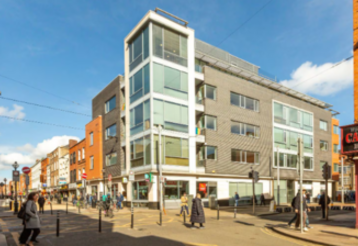COVID-19
At a glance: What's changing and what stays the same

The Government has agreed that most of the public health measures currently in place can be removed, following advice from the NPHET.
The Government has agreed that most of the public health measures currently in place can be removed, following advice from the National Public Health Emergency Team.
But some regulations will remain in place and will be reviewed on 28 February.
The Government has also announced the extension of several business supports.
Here is what is changing - and what is not - regarding Covid-19 restrictions.
What is happening immediately?
The following curbs have been removed from 6am this morning:
- Guidance in relation to household visiting
- Early closing time for hospitality and events
- Capacity restrictions for outdoor events, including sporting fixtures
- Capacity restrictions for indoor events. This includes weddings, where the limit of a maximum of 100 guests is now gone
Hospitality back to normal
Requirements to have a valid Digital Covid Certificate to enter various premises have also been removed.
Hospitality venues no longer need to have physical distancing, people can order at the bar and do not need to be seated while being served.
The requirement to take contact details from customers has also ended.

Capacity restrictions have been lifted for weddings
Returning to workplace
A return to physical attendance in workplaces can commence on a phased basis appropriate to each sector from Monday, 24 January.
Minister for Health Stephen Donnelly said this process should be informed by consultations with workers.
In a post on Twitter, he said there would be engagement between Government, trade unions and employer representatives.
Mask wearing to continue
A number of public health regulations will remain in place until they are reviewed on 28 February - this includes the wearing of masks in certain settings as follows:
- Public transport, taxis and at stations/airports/ports
- Retail premises (including shopping centres, libraries, cinemas, theatres, museums, post offices, banks)
- Public offices and premises providing specified services and businesses (including salons, hairdressers, travel agents, laundries, dry cleaners, bookmakers)
- Customer facing roles in premises where food and beverages are sold for consumption on the premises
Schools and childcare
Protective measures in schools and early learning and care facilities - such as the wearing of masks - will remain in place until at least 28 February when public health regulations will be reviewed.
Minister for Children Roderic O'Gorman said the current position is that early learning and childcare services should continue to operate under the sectoral guidance, with play-pods remaining a key feature.
"This approach is in line with schools and is in effect until 28 February."
He added: "I will continue to engage regularly with the Covid-19 Sub-Group of the Early Learning and Childcare Stakeholder Forum and with public health experts and provide regular updates as necessary."
Nightclubs
While nightclubs can operate again, some will have to wait until Wednesday to open their doors.
Arts Minister Catherine Martin said this was due to the need for venues to apply for a late licence through the courts.

Nightclubs will be able to operate late opening from Wednesday
Overseas travel
The Digital Covid Cert and Passenger Locator Form will remain in place for the time-being.
From 1 February, for travel purposes, the Digital Covid Cert based on primary vaccination only will expire after 270 days (nine months).
An updated DCC can be obtained for those who have received a booster dose and can be accessed through the self service HSE portal.
Financial supports
The reduced levels of Employment Wage Subsidy Scheme (EWSS), due to commence on 1 February, will be delayed by a month for businesses that were directly impacted by the public health restrictions introduced in December 2021.
A restart payment of one week's support will be paid to Covid Restrictions Support Scheme (CRSS) recipients to assist reopening.
The tax debt warehousing scheme to provide liquidity support to businesses will be extended by a month to 30 April 2022.
Fees for special exemption orders for late licences by nightclubs and bars will continue to be waived until the 30 April.
The PUP will close for new applications from 22 January. Anyone remaining on PUP will move to a weekly rate of €208 with effect from payments made on 8 March.
After that, remaining PUP recipients will start transitioning to standard jobseeker terms, and if eligible, will move onto a jobseekers payment with effect from payments on 5 April.
Enhanced illness benefit will be extended until the end of June 2022.

Business and wage supports are being extended by Government
Rules around close contacts
The Government warned the pandemic is "not over and the emergence of new variants with increased levels of transmissibility, immune escape and/or virulence remains a risk both nationally and globally".
As a result, it is advising people to continue to follow the current advice for those with symptoms, cases and close contacts.
This includes - for a period of 10 days (including 7 days self-isolation or restricted movements) - that people with Covid and their close contacts should:
- limit close contact with other people outside their household, especially in crowded, enclosed or poorly ventilated spaces
- wear an appropriate face mask/face covering in crowded, enclosed or poorly ventilated spaces and where they are in close contact with other people
- take an antigen test before entering crowded, enclosed or poorly ventilated spaces and prior to having close contact with other people from outside their household
- avoid contact with anyone who is at higher risk of severe illness if infected with Covid-19
- work from home unless it is essential to attend in person
- follow all public health protective measures
Concerns around restrictions ending
"The emergency is over in terms of the restrictions but the pandemic isn’t," Taoiseach Micheál Martin said.
The Chief Medical Officer, Dr Tony Holohan, urged people to maintain much of the public health advice "particularly on close contacts and testing, vaccines and mask wearing".
He emphasised the importance of "staying out of circulation" if you have any symptoms.
In a statement, the Government said it "accepts that individuals may still have concerns about themselves or their family members".
It advises people to "continue to assess their individual situation". There are ways to reduce risk, especially for those who may be more vulnerable available here.
Source


